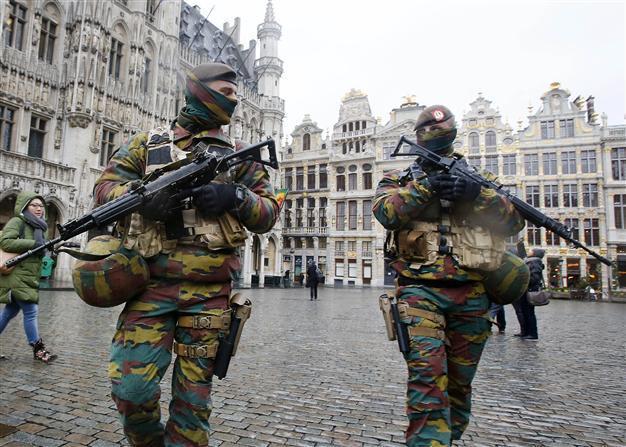Brussels on top alert as manhunt goes on
BRUSSELS

Belgium police officers patrol the Grand Place in central Brussels, Belgium, Tuesday, Nov. 24, 2015. AP Photo
Brussels will remain at the highest security threat level for another week over fears of an imminent terror attack, the Belgian government said Nov. 23, amid a continued manhunt to find a key suspect in the Paris attacks on Nov. 13 that killed 130 people.
Fearing a similar attack, Belgium maintained an unprecedented security lockdown in Europe’s capital, Brussels, with Prime Minister Charles Michel warning on Nov. 23 that the threat “remains serious and imminent,” Agence France-Press reported.
The army and armed police will remain on the streets in coming days, Michel said, but schools and the metro system would reopen starting Nov. 25.
The European Union and NATO, which both have their headquarters in Brussels, said they would bolster security and urged non-essential staff to work from home.
The alert will be reviewed again on Nov. 30.
Meanwhile, the federal prosecutor’s office announced that a man who was arrested during a large police operation in Belgium late Nov. 22 has been charged with involvement in the Paris attacks, the fourth so far.
Mohammed Amri, 27, and Hamza Attou, 20, were charged on Nov. 23 on suspicion of helping Belgian-born Salah Abdeslam, a key suspect of the Paris attacks, escape to Brussels after the attacks, while a third unnamed person faces charges of aiding him when he reached the city.
In Brussels, an eerie atmosphere hung over the city with soldiers in camouflage patrolling everywhere, from railway stations to EU institutions.
In the normally bustling historic Grand Place, a few bars and restaurants were open for business but they were struggling to find customers.
French President François Hollande was scheduled to meet U.S. President Barack Obama on Nov. 24 in Washington, a day after the French president met with British Prime Minister David Cameron.
Hollande will hold talks with Germany’s Angela Merkel on Nov. 25, Russia’s Vladimir Putin on Nov. 26 and Chinese President Xi Jinping on Nov. 28, as world leaders rally support for a global fight to crush ISIL.
The U.N. Security Council on Nov. 20 authorized “all necessary measures” to fight the group.
France said Nov. 24 that it would install security gates at the Paris and Lille stations of the high-speed Thalys train, the target of a previous failed attack which police believe may be connected to the deadly Paris assaults.
In August, a suspected Islamist militant carrying an assault rifle was overpowered by passengers on the cross-border train. French police are investigating if Abdelhamid Abaaoud, the suspected mastermind of attacks in Paris that killed 130 people and who himself was killed in a police raid on Nov. 17 in a Parisian suburb, was involved.
Gates would be installed in Paris and Lille before Dec. 20, and similar measures were planned in Brussels and Amsterdam, French Energy Minister Segolene Royal, who is also in charge of transport, said. She did not specify what kind of security gates would be installed.
As a support to France against ISIL, Cameron vowed Nov. 23 to make his case for Britain joining air strikes on Syria on Nov. 26 in the House of Commons as he unveiled a new defense strategy stressing counter-terrorism and intelligence.
Cameron’s comments came as he presented the Strategic Defense and Security Review (SDSR), which maps Britain’s military strategy for the next five years.
“As the murders on the streets of Paris reminded us so starkly, ISIL is not some remote problem thousands of miles away, it is a direct threat to our security at home and abroad,” Cameron said. “History teaches us that no government can predict the future... but we can make sure that we have the versatility and the means to respond to new risks and threats to our security as they arise.”
